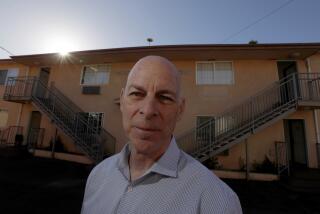Consultant Fee Scheme Denied by Ex-HUD Chief : In Heated Hearing, Pierce Contradicts Testimony by Ex-Aide
WASHINGTON â In a heated confrontation that erupted into a shouting match, former Housing and Urban Development Secretary Samuel R. Pierce Jr. denied to a congressional panel Thursday that he had used a low-income housing rehabilitation program to generate large consulting fees for prominent Republicans.
In his first public testimony on the growing controversy over the program, Pierce contradicted a former subordinateâs sworn testimony. The subordinate had said that Pierce took steps to ensure that certain favored projects were funded under the program. Republican consultants including former Interior Secretary James G. Watt collected large fees from developers sponsoring the projects.
Pierce, now a private attorney in New York, insisted that he had delegated the selection of rehabilitation projects exclusively to a three-member committee in the department, which he headed for eight years under former President Ronald Reagan. But he acknowledged that the program was badly flawed and had too little supervision.
âFunny Businessâ
âAll this funny business. . . ,â Pierce said, referring to the consulting fees. âWe should have gotten rid of this program.â
Rep. Tom Lantos (D-San Mateo), chairman of the House subcommittee that questioned Pierce at a hearing on the matter, charged that the program had been rife with âinfluence-peddling, mismanagement and exorbitant fees.â
A committee source said that the panel, the employment and housing subcommittee of the Committee on Government Operations, plans to write legislation to prevent similar abuses in future programs. It also eventually will refer any evidence of criminal wrongdoing to the Justice Department, the source said.
Several panels in the Democratic-controlled House and Senate are looking into the program in the wake of a highly critical audit of its activities by Paul Adams, the HUD inspector general.
The program, which has since been canceled, provided subsidies for state and local public housing agencies for the rehabilitation of low-income units. The agencies distributed the money to developers who did the work and maintained the units.
Pierce said that the program was difficult to administer because Congress had abandoned a âfair shareâ guideline. The guideline had required that projects based on need be distributed across the nation. Without that guideline, the choice was left to the discretion of HUD officials.
Adamsâ lengthy report said that Republican consultants, including some former HUD officials, had taken advantage of the program to earn huge fees by getting contracts for private developers. Firms associated with Frederick Bush, a major fund-raiser for President Bush but no relation, and Paul Manafort, a Washington consultant who had aided the Bush and Reagan campaigns, were among those receiving fees.
Shouting erupted in the hearing when the former Cabinet member declared that Adamsâ report did ânot cover the extent to which those affiliated with the Democratic Partyâ also had benefited from the program.
Challenging this statement, Rep. Barney Frank (D-Mass.) asked Pierce if he was saying that Adams had omitted information he had gathered that was damaging to Democrats. If so, said Frank, why would a Republican-appointed inspector general do so?
When Pierce said that he had no evidence of this, Frank, his voice rising, countered that Pierce had been âhighly irresponsibleâ in making such a statement.
âIâm not highly irresponsible!â Pierce shot back.
âI say thereâs nothing about Democrats in that report! . . . I said that he (Adams) should go and look for Democrats. . . .â
Frank, interrupting, shouted that âYouâre accusing the inspector general . . . to try to deflect some of the blame from the Administration of which you were a part.â
Pierce, suddenly lowering his voice, declared: âI just said I believe there are Democrats . . . but the emphasis in the report was on former high-ranking people in HUD who took advantage (of the program).â
Citing a bad memory and a busy schedule as secretary, Pierce said that he could not recall meeting with several consultants named in the report. But he recalled meeting with Watt, who as a consultant was seeking a renewal contract for a 300-unit project near Baltimore for his client. Watt received a reported $300,000 consulting fee when the contract was approved.
âDid you talk to Watt about more than one project?â asked Rep. Charles E. Schumer D-N.Y.), a member of the panel.
âI may have,â Pierce replied. âI donât remember.â
Pierce denied that he had pulled strings for certain projects. He said that he merely had told subordinates: âLetâs give this careful consideration . . . and see if it complies with all rules and regulations.â
Pierce firmly denied testimony to the committee last month by Thomas T. Demery, a former HUD official, that Pierce had instructed his executive assistant, Deborah Gore Dean, to get subordinates to approve certain favored projects.
âShe didnât have the authority to do that,â Pierce declared.
He also had âno recollectionâ of a meeting mentioned by Demery on Jan. 13, 1987, at which Pierce, Dean and Demery had allegedly discussed certain renovation projects. Dean has declined to give a statement so far.
Pierce said that he had tried to revise the program that year to make it more structured but the revisions did not improve it. He agreed with Rep. Bruce A. Morrison (D-Conn.) that Congress had intended developers to present their proposals to local public housing authorities rather than to HUD headquarters. But the local housing authorities, said Pierce, usually insisted that HUD make all the decisions.
More to Read
Sign up for Essential California
The most important California stories and recommendations in your inbox every morning.
You may occasionally receive promotional content from the Los Angeles Times.










